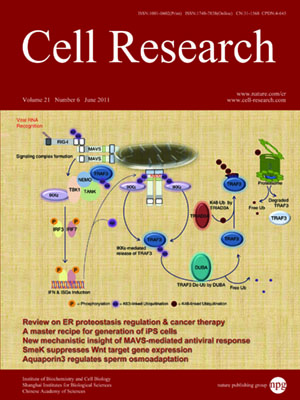
Volume 21, No 6, Jun 2011
ISSN: 1001-0602
EISSN: 1748-7838 2018
impact factor 17.848*
(Clarivate Analytics, 2019)
Volume 21 Issue 6, June 2011: 884-894
ORIGINAL ARTICLES
Rational optimization of reprogramming culture conditions for the generation of induced pluripotent stem cells with ultra-high efficiency and fast kinetics
Jiekai Chen*, Jing Liu*, You Chen, Jiaqi Yang, Jing Chen, He Liu, Xiangjie Zhao, Kunlun Mo, Hong Song, Lin Guo, Shilong Chu, Deping Wang, Ke Ding and Duanqing Pei
Key Laboratory of Regenerative Biology, South China Institute for Stem Cell Biology and Regenerative Medicine at Guangzhou Institutes of Biomedicine and Health, Chinese Academy of Sciences, Guangzhou 510530, China
Correspondence: Duanqing Pei,(pei_duanqing@gibh.ac.cn)
The ectopic expression of several transcription factors can restore embryonic cell fate to cultured somatic cells and generate induced pluripotent stem cells (iPSCs), revealing a previously unknown pathway to pluripotency. However, this technology is currently limited by low efficiency, slow kinetics and multi-factorial requirement. Here we show that reprogramming can be improved and dramatically accelerated by optimizing culture conditions. First, we developed an optimized defined medium, iCD1, which allows Oct4/Sox2/Klf4 (OSK)-mediated reprogramming to achieve ultra-high efficiency (~10% at day 8). We also found that this optimized condition renders both Sox2 and Klf4 dispensable, although the elimination of these two factors leads to lower efficiency and slower kinetics. Our studies define a shortened route, both in timing and factor requirement, toward pluripotency. This new paradigm not only provides a rationale to further improve iPSC generation but also simplifies the conceptual understanding of reprogramming by defined factors.
Cell Research (2011) 21:884-894. doi:10.1038/cr.2011.51; published online 29 March 2011
FULL TEXT | PDF
Browse 2189


